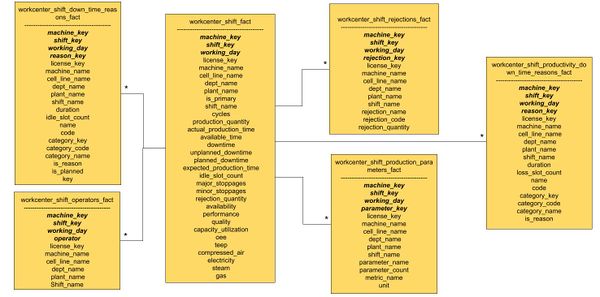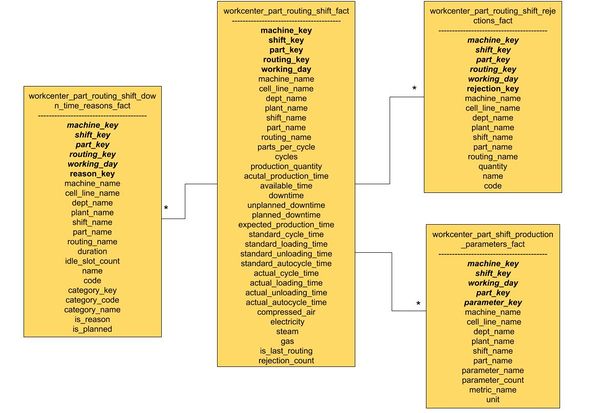Difference between revisions of "Analytics Data Model"
(Tag: Visual edit) |
(Tag: Visual edit) |
||
| Line 1: | Line 1: | ||
== Data Model == | == Data Model == | ||
The Data Model is divided into 3 sections: | The Data Model is divided into 3 sections: | ||
| − | # '''Productivity Data Model''' | + | # '''Workcenter Shift Productivity Data Model''' |
| − | # ''' | + | # '''Part Shift Productivity Data Model''' |
| − | # ''' | + | # '''Hourly Data Model''' |
| − | === Productivity Data Model === | + | === Workcenter Shift Productivity Data Model === |
| − | MInt Productivity data, | + | MInt Productivity data, which is data about performance. This data is rolled up at the shift level for shift level productivity analysis. |
| − | |||
Here is a diagram that represents the data model. | Here is a diagram that represents the data model. | ||
| − | [[File: | + | [[File:MINT Analytics Data Model - WorkCenterShiftFact.jpg|600x600px]] |
The main tables are: | The main tables are: | ||
| − | ''''' | + | '''WorkcenterShiftFact'':''''' Productivity data is centered around a workcenter which is a machine that is performing the task. This table contains the primary shift level productivity parameters. |
| − | <Link to detailed documentation where you should describe every column and the information it contains for all tables. Use this as an opportunity to rename columns that sound confusing> | + | '''<Link to detailed documentation where you should describe every column and the information it contains for all tables. Use this as an opportunity to rename columns that sound confusing>''' |
'''WorkcenterShiftDownTimeReasonsFact''': Downtimes represent durations when the machine was non-operational. This table contains information about the downtimes for a workcenter for a shift and the reasons for it. | '''WorkcenterShiftDownTimeReasonsFact''': Downtimes represent durations when the machine was non-operational. This table contains information about the downtimes for a workcenter for a shift and the reasons for it. | ||
| Line 24: | Line 23: | ||
'''WorkcenterShiftOperatorsFact''': This table contains information about the operators working on the workcenter for a given shift. | '''WorkcenterShiftOperatorsFact''': This table contains information about the operators working on the workcenter for a given shift. | ||
| + | |||
| + | '''CHECK''' | ||
'''*WorkcenterShiftProductivityDownTimeReasonsFact''': Captures details of all the downtime incidents occurring on a workcenter when it is running on a given day. | '''*WorkcenterShiftProductivityDownTimeReasonsFact''': Captures details of all the downtime incidents occurring on a workcenter when it is running on a given day. | ||
| Line 32: | Line 33: | ||
# Here is an example of how you can use the data model to analyze [[Create your own custom dashboards|average OEE by Workcenters]]. | # Here is an example of how you can use the data model to analyze [[Create your own custom dashboards|average OEE by Workcenters]]. | ||
| − | ==== | + | === ADD VIDEO HERE === |
| − | |||
| − | == | + | === '''Part Shift Productivity Data Model''' === |
| + | MInt Part Productivity data, which is data about part level performance. This data is rolled up at the shift level for shift level part productivity analysis. | ||
| − | + | Here is a diagram that represents the data model. | |
| − | |||
| − | |||
| − | |||
| − | |||
| − | |||
| − | |||
| − | |||
| − | |||
| − | |||
| − | |||
| − | |||
| − | |||
| − | |||
| − | |||
| − | |||
| − | |||
| − | |||
| − | |||
| − | |||
| − | |||
| − | |||
| − | |||
| − | |||
| − | |||
| − | |||
| − | |||
| − | |||
| − | |||
| − | |||
| − | |||
| − | |||
| − | |||
| − | |||
| − | + | [[File:MINT Analytics Data Model - WorkcenterPartRoutingShiftFact.jpg|600x600px]] | |
| − | + | The main tables are: | |
| − | The | + | '''WorkcenterPartRoutingShiftFact:''' The Part Productivity data is centered around a Part that is being produced on the workcenter. This table contains the primary shift level part productivity parameters. |
| − | + | '''WorkcenterPartRoutingShiftDownTimeReasonsFact:''' Downtimes represent durations when the machine was non-operational. This table contains information about the downtimes for a Part (when the part was booked) for a shift and the reasons for it. | |
| − | + | '''WorkcenterPartRoutingShiftRejectionsFact:''' Rejections are quality defects on a workcenter. The table contains information about these quality rejections for a Part for a shift and the reasons for it. | |
| − | + | '''CHECK''' | |
| − | + | '''WorkcenterPartShiftProductionParametersFact:''' | |
Revision as of 06:47, 22 May 2020
Contents
[hide]Data Model
The Data Model is divided into 3 sections:
- Workcenter Shift Productivity Data Model
- Part Shift Productivity Data Model
- Hourly Data Model
Workcenter Shift Productivity Data Model
MInt Productivity data, which is data about performance. This data is rolled up at the shift level for shift level productivity analysis.
Here is a diagram that represents the data model.
The main tables are:
WorkcenterShiftFact: Productivity data is centered around a workcenter which is a machine that is performing the task. This table contains the primary shift level productivity parameters.
<Link to detailed documentation where you should describe every column and the information it contains for all tables. Use this as an opportunity to rename columns that sound confusing>
WorkcenterShiftDownTimeReasonsFact: Downtimes represent durations when the machine was non-operational. This table contains information about the downtimes for a workcenter for a shift and the reasons for it.
WorkcenterShiftRejectionsFact: Rejections are quality defects on a workcenter. The table contains information about these quality rejections for a workcenter for a shift and the reasons for it.
WorkcenterShiftOperatorsFact: This table contains information about the operators working on the workcenter for a given shift.
CHECK
*WorkcenterShiftProductivityDownTimeReasonsFact: Captures details of all the downtime incidents occurring on a workcenter when it is running on a given day.
*WorkcenterShiftProductionParametersFact: Captures details of all the production parameters produced on a workcenter when it's running on a given day.
Examples of using the object model to create dashboards:
- Here is an example of how you can use the data model to analyze average OEE by Workcenters.
ADD VIDEO HERE
Part Shift Productivity Data Model
MInt Part Productivity data, which is data about part level performance. This data is rolled up at the shift level for shift level part productivity analysis.
Here is a diagram that represents the data model.
The main tables are:
WorkcenterPartRoutingShiftFact: The Part Productivity data is centered around a Part that is being produced on the workcenter. This table contains the primary shift level part productivity parameters.
WorkcenterPartRoutingShiftDownTimeReasonsFact: Downtimes represent durations when the machine was non-operational. This table contains information about the downtimes for a Part (when the part was booked) for a shift and the reasons for it.
WorkcenterPartRoutingShiftRejectionsFact: Rejections are quality defects on a workcenter. The table contains information about these quality rejections for a Part for a shift and the reasons for it.
CHECK
WorkcenterPartShiftProductionParametersFact:

